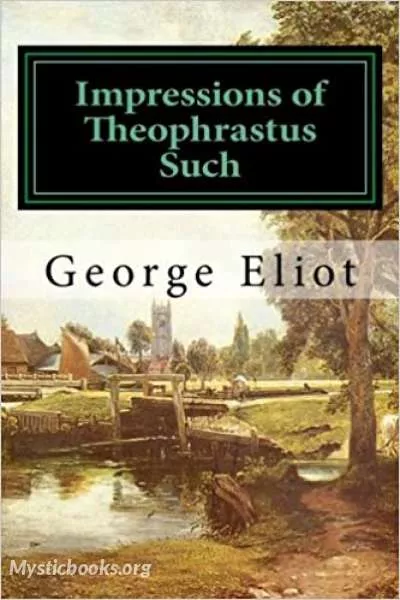
Impressions of Theophrastus Such
by George Eliot
'Impressions of Theophrastus Such' Summary
Ch. I “Looking Inward”: Theophrastus Such introduces himself and states his purpose and the circumstances leading up to writing this book. He also tells the readers to be prepared for writings of confession as well as performance, and that the readers will have to work to understand the allusions and accounts of his character before judging the work.
Ch. II “Looking Backward”: Discusses Theophrastus Such’s boyhood in the Midlands, containing some memories of George Eliot’s own childhood in Warwickshire.
Ch. III “How We Encourage Research”: A devastating and (stiff upper lip) hilarious account of the way one titan of science obliterates the career of a young challenger in order to defend his turf, before quietly stealing his idea and publishing it as his own. Theophrastus Such describes Proteus Merman and his attempt to join a circle of the educated. Proteus Merman’s exclusion and inability to join the group is highlighted by the contrasting of Proteus’ last name with those of the other members. As a “merman,” Proteus is doomed to be an onlooker of this community, all of whom are named after cetaceans (Narwhale, Grampus, etc . . .). In addition, Proteus Merman and his wife, Julia, share similarities with characters from Middlemarch, Casaubon and Dorothea, whose relationship can be compared with the relationship between George Eliot and her husband, George Henry Lewes. Eliot denied George Henry Lewes was the model for Causabon; however, significant aspects of the character match with Lewes’s experience as a man of science, including his response to criticism in “determin[ing] to prove his own theories scientifically infallible,” his status as an “unfulfilled researcher,” and his lack of success in garnering respect and acknowledgement with his research, which also applies to Proteus Merman. Like Dorothea and Marian Evans, Julia is a devoted wife. Her marriage, similar to Dorothea’s with Causabon, is poisoned by her husband’s disappointment as he “gradually becomes rancorous and suspicious”. Both situations display how single-minded focus puts a strain on relationships and how a certain flexibility of mind and attention is healthy and something to be grateful for.
Ch. IV “A Man Surprised at His Originality”: A written eulogy of Lentulus, a man who critiqued the writing of others and boasted of the perfect verse he would soon write and never did, another echo of Eliot’s Edward Casaubon.
Ch. V “A Too Deferential Man”: Theophrastus Such describes Hinze, who has no goal for himself in mind whatsoever.
Ch. VI “Only Temper”: This chapter is about the angry temperament of Touchwood. Such condemns Touchwood for his behavior, contending that a usually good and benevolent personality cannot make up for poor conduct.
Ch. VII “A Political Molecule”: Cotton manufacturer Spike alliances with businessmen for his own profit, though his actions are for the benefit of the group.
Ch. VIII “The Watch-dog of Knowledge”: Theophrastus Such speaks of Mordax and attempts to vindicate him.
Ch. IX “A Half-breed”: Inspired by George Eliot’s experience with Evangelicalism in Nuneaton and continuing the theme of the lives of clergymen in The Scenes of Clerical Life, Ch. IX “A Half-bread” follows Mixtus, a man formerly of religious and reforming inclination until he moved to London, married, and became a man hunting after wealth.
Ch. X “Debasing the Moral Currency”: Theophrastus Such expresses his worry over the breakdown of civilization, referencing classical texts and acts of violence that occurred in the 1800s.
Ch. XI “The Wasp Credited with the Honeycomb”: Theophrastus Such mocks communism and the concept that there is a definitive origin for ideas. It is a retelling of Aesop’s “The Worker Bee, the Drone, and the Wasp."
Ch. XII "So Young!": A man called Ganymede has not released the image of himself he had held as a child. Then, he had been told how young and girlishly pretty he was, and he still acts as if those descriptions apply.
Ch. XIII “How We Come to Give Ourselves False Testimonials and Believe in Them”: The chapter explores the importance of accurate representation. This includes facing what we have become inwardly as well as outwardly.
Ch. XIV “The Too Ready Writer”: Pepin wishes to write a romance encapsulating a time (ancient Rome and other past ages) but without writing of the common element. He writes historical fiction without accuracy, not worthily representing the times, an error Eliot consciously avoided in her writing of her historical novel, Romola.
Ch. XV “Diseases of Small Authorship”: Theophrastus Such analyzes an egotistical female writer called Vorticella (vorticellae are one-celled, parasitic organisms). Her life is described as if seen through a microscope, interacting with other small organisms.
Ch. XVI “Moral Swindlers”: Mine-owner Gavial Mantrap, first described as a moral man, swindles verbally and financially. A message from this chapter is a man who is kind to his family but wrongfully uses their political and financial ability cannot be called moral, and that those holding great skill with words have even more responsibility to use them carefully with consideration to their moral impact.
Ch. XVII, “Shadows of the Coming Race”: This chapter represents a discussion between Theophrastus Such and his friend Trost, a man with great interest in technology, about the future and the use of machines. Theophrastus Such believes machines will come to a point where they can supersede men.
Ch. XVIII, “The Modern Hep! Hep! Hep!”: Theophrastus Such turn introspective, comparing himself and the exile he felt described in Ch. II “Looking Backwards” with the history of the Jews.
Book Details
Language
EnglishOriginal Language
EnglishPublished In
1879Authors
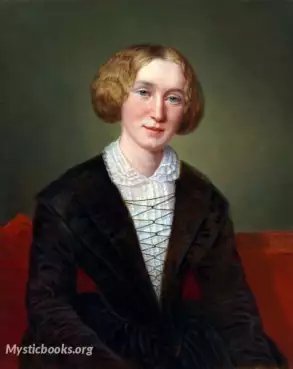
George Eliot
England
Mary Ann Evans known by her pen name George Eliot, was an English novelist, poet, journalist, translator and one of the leading writers of the Victorian era. Like Charles Dickens and Thomas Hardy, she...
Books by George EliotDownload eBooks
Listen/Download Audiobook
Related books

Anna Karenina, Book 3 by Leo Tolstoy
Anna Karenina is a classic novel by Leo Tolstoy that explores the complex themes of love, duty, and social constraints in 19th-century Russia. The sto...

War and Peace, Volume 3 (Maude Translation) by Leo Tolstoy
Leo Tolstoy's *War and Peace* is an epic novel that chronicles the lives of several Russian families during the Napoleonic Wars. The novel follows the...
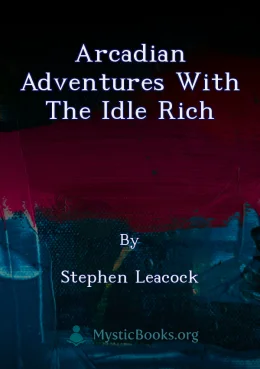
Arcadian Adventures with the Idle Rich by Stephen Leacock
Stephen Leacock's "Arcadian Adventures with the Idle Rich" is a witty and satirical look at the lives of the wealthy in a large American city. Leacoc...

Vicky Van by Carolyn Wells
In Carolyn Wells's captivating mystery, "Vicky Van," the seemingly innocent and beloved socialite Vicky Van finds herself at the center of a shocking...
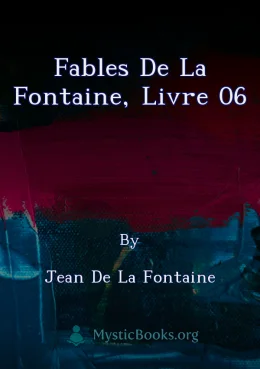
Fables de La Fontaine, livre 06 by Jean de La Fontaine
Dans ce livre sixième comme dans tous les autres livres des Fables de La Fontaine, vous serez à même de constater la fine observation des éternels com...

Room with a View by E. M. Forster
When Lucy Honeychurch travels to Italy with her cousin, she meets George Emerson, a bohemian and an atheist who falls in love with her. Upon her retur...

The Yellow Face by Fred M. White
A murdered body, horribly disfigured and bearing a striking resemblance to the man on the poster, vanishes from a police-station.
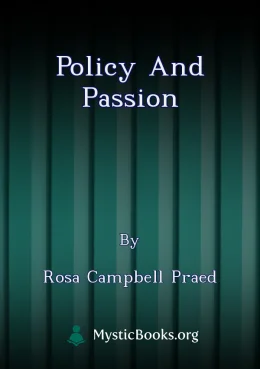
Policy and Passion by Rosa Campbell Praed
Set in the early days of Australia, "Policy and Passion" explores the complex interplay between personal desires and societal expectations. Thomas, a...

Middle Age Enthusiasms by Thomas Hardy
Thomas Hardy's *Middle Age Enthusiasms* delves into the complexities of aging and the changing nature of human experience. The work explores themes o...
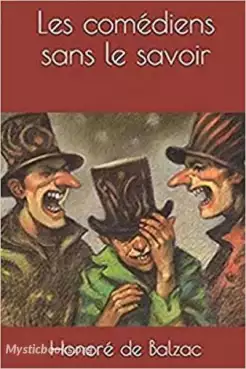
La Comédie Humaine: Les Comédiens sans le savoir by Honoré de Balzac
Les Comédiens sans le savoir est un roman d’Honoré de Balzac, paru en prépublication en 1846 dans Le Courrier français, édité en volume la même année...
Reviews for Impressions of Theophrastus Such
good